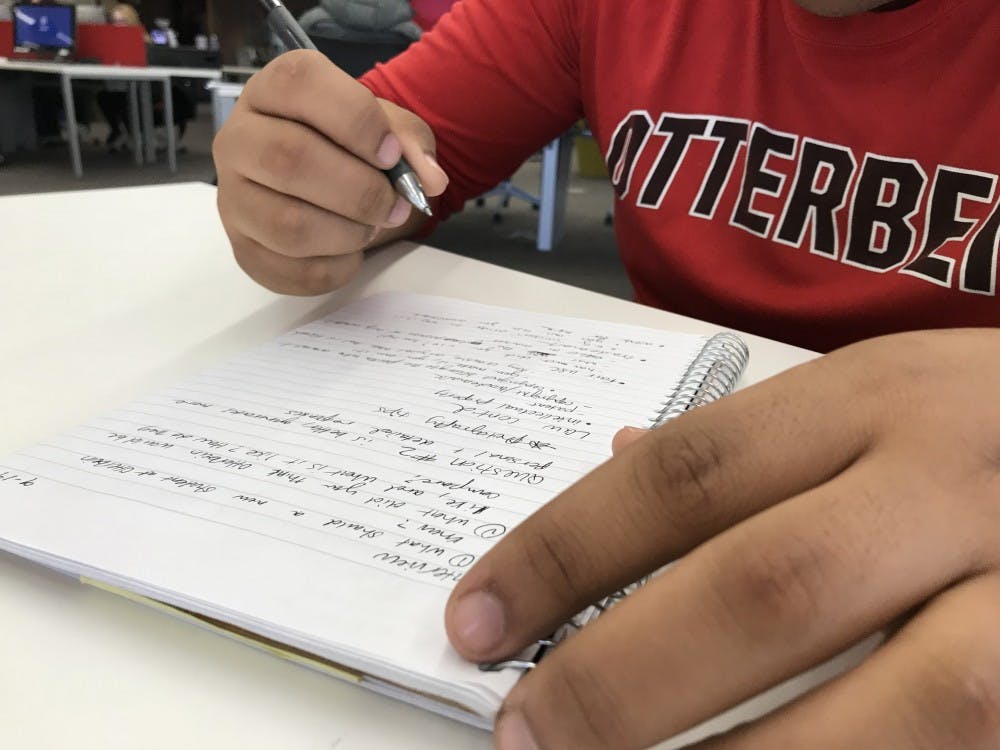Many students at Otterbein have full schedules throughout their day, and the expectation to study two hours outside of class per week for every credit hour seems excessive to some students. This norm, while intended to foster deep learning and intellectual rigor, has sparked a conversation about the balance between academic pursuits and the richness of college life beyond the classroom.
Amid Towers and Roush Hall and students on their way to class, Brandon Thomas, a senior finance major on the wrestling team, feels the weight of this expectation. "I think it's a bit excessive," Thomas said when referring to the 30 hours of homework expected when taking 15 credit hours.
The Otterbein Undergraduate Course Catalog has descriptions and expectations of all classes at the university. Information about the hours expected for out of class time work can be found in Otterbein's Academic Policies and Procedures.
Otterbein encourages students to engage beyond academics. Olivia Kahoun, a senior education major on the track team said, "With Otterbein being a smaller school, many students are involved in extracurricular activities that take up several hours of their time every week, on top of many students having off-campus jobs to support themselves." This involvement is not just for leisure; it's a vital part of personal growth, networking, and preparing for the world beyond college.
The duo acknowledges that for certain subjects, especially those requiring lab work, research, or intensive practice, such as outside workload might be justified.
"For some classes, this might be necessary, but for the most part, I believe that six hours of out-of-class work isn’t necessary," said Thomas. This reflection opens a broader debate about the nature of learning and the purpose of assignments. Many students wonder if the workload is genuinely enhancing understanding, or just adding to the pile of tasks.
In a survey based on 1,000 respondent answers done at Grand Canyon University, it was discovered that 50.5% of students study 0-2 hours a day, with 34.4% studying 3-4 hours per day. The students who said they study less than 2 hours a day say it's due to extracurriculars, on-campus commitments and work.
There is also a correlation between food insecurity and academics. In a 2020 study completed by Food Insecurity Among College Students, it was reported that 32% reported that food insecurity is a problem that students faced, while 53% missed class and 25% dropped a class due to a housing or food dilemma.
Dr. Kristy McCray Ph.D., Otterbein Health & Sports Sciences associate professor, said, "Ideally, the credit hour policy helps students understand their workload to better manage their time outside of class. Of course, there are some weeks we may have a bit less work than the requisite outside of class time or work, but other weeks there are more."
When assigning out-of-class work, McCray understands that not all students are the same, and some may take more time to complete assignments and readings than others, which can vary among students on how much outside of class work they put in to one of her classes.
"I can assign out of class work assuming it would take most students an average amount of time. But if someone is a fast reader, then it may take them less time than the average student; or if they are still working on their writing skills, it may take them longer than other students to write a good paper," McCray said.
The question remains open, a topic of discussion in student lounges, faculty meetings,and administrative offices. Many are trying to figure out how they ensure that students are challenged yet not overwhelmed, prepared yet not exhausted. The answer is not simple, but the conversation is a step towards a solution that will help students to grow their mind's capacity while also creating a life beyond the classroom walls.








